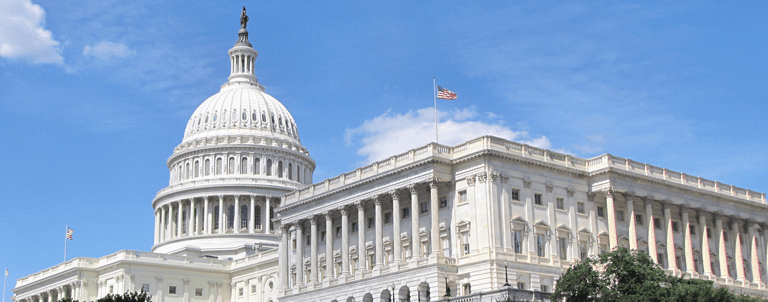
This summer, Congress navigated many complex priorities as lawmakers prepared to return to their home districts for August recess. Notably, the House Appropriations Committee approved the fiscal year (FY) 2025 House Labor, Health and Human Services, and Education (L-HHS-ED) bill on a party-line vote. However, this bill still awaits a vote by the full U.S. House of Representatives. This critical bill outlines funding for biomedical research, public health activities, education grants, workforce programs, and federal student aid, and would provide a total of $185.8 billion in discretionary spending, or a 4 percent decrease compared to the enacted FY 2024 levels and $36.2 billion below President Biden’s budget request.
Of particular interest to ASHG members, the House bill would provide $48.1 billion for the National Institutes of Health (NIH), an increase of $1 billion above the FY 2024 enacted level, and $500 million for the Advanced Research Projects Agency for Health (ARPA-H), $1 billion below its FY 2024 enacted level. Additionally, the bill would restructure NIH to reflect the NIH Reform Framework released by House Energy and Commerce (E&C) Committee Chair Rep. Cathy McMorris Rodgers (R-WA), to which ASHG responded detailing the implications of the proposed recommendations on genomics research, diverse research cohorts, and the research workforce.
 Meanwhile, in the other chamber, the Senate Appropriations Committee approved their FY 2025 L-HHS-ED appropriations bill on August 1 by a bipartisan vote of 25-3. The Senate version of the bill would provide $48.8 billion for NIH, which would be a $1.7 billion increase over FY 2024 enacted funding levels, and $1.5 billion in funding for ARPA-H, flat with FY 2024 enacted levels. The bill would restore funding to the FY 2023 enacted levels for programs funded through the 21st Century Cures Act, including $419 million for the All of Us Precision Medicine Program, $450 million for the Brain Research through Application of Innovative Neurotechnologies (BRAIN) Initiative, and $216 million for the Cancer Moonshot Initiative. Informed by the Biden Administration’s broad health priorities, the bill would also provide targeted increases to several specific research areas, including mental health research, cancer research, and research on women’s health. ASHG has released a statement regarding the Senate Appropriations Committee’s L-HHS-ED bill.
Meanwhile, in the other chamber, the Senate Appropriations Committee approved their FY 2025 L-HHS-ED appropriations bill on August 1 by a bipartisan vote of 25-3. The Senate version of the bill would provide $48.8 billion for NIH, which would be a $1.7 billion increase over FY 2024 enacted funding levels, and $1.5 billion in funding for ARPA-H, flat with FY 2024 enacted levels. The bill would restore funding to the FY 2023 enacted levels for programs funded through the 21st Century Cures Act, including $419 million for the All of Us Precision Medicine Program, $450 million for the Brain Research through Application of Innovative Neurotechnologies (BRAIN) Initiative, and $216 million for the Cancer Moonshot Initiative. Informed by the Biden Administration’s broad health priorities, the bill would also provide targeted increases to several specific research areas, including mental health research, cancer research, and research on women’s health. ASHG has released a statement regarding the Senate Appropriations Committee’s L-HHS-ED bill.
Congress has now reconvened after an August recess, and the House and Senate Appropriations Committees are negotiating to reconcile the differences between their FY 2025 appropriations bills. Any discrepancies must be resolved before setting the final FY 2025 funding levels for NIH. Given the limited legislative days remaining before the new fiscal year begins on October 1, it is unlikely that either chamber will complete final consideration of their respective L-HHS-ED bills by September 30. A temporary funding measure – a continuing resolution (CR) – will be necessary to avoid a government shutdown. On September 6, House Republicans introduced the “Continuing Appropriations and Other Matters Act” which would have temporarily extended government funding until March 28, 2025. However, the bill was pulled from the floor as it lacked the support required to pass. Congress must now race against the clock to extend government funding before it expires at the end of the month.
 As the 2024 election season rapidly approaches, changes to congressional party seats and numerous retiring members will lead to substantial changes in key committee leadership positions in the next Congress, impacting future research priorities and funding. Despite differing agendas, different parties share common priorities, such as advancing artificial intelligence (AI) and emerging technologies, maintaining competitiveness with China, and addressing the mental health crisis. However, the specific priorities of a Democratic Administration compared to a Republican Administration will depend on unity within the next government. For example, a considerable number of federal agency leadership positions are appointed by the President, and many require Senate confirmation. The efficiency of the appointment process in the next Administration will be influenced by the President’s leadership and science priorities and which party controls the Senate. Furthermore, shifts in leadership roles on congressional committees will affect legislation that seeks to restructure and change policies at federal agencies like NIH and will have an impact on research funding levels.
As the 2024 election season rapidly approaches, changes to congressional party seats and numerous retiring members will lead to substantial changes in key committee leadership positions in the next Congress, impacting future research priorities and funding. Despite differing agendas, different parties share common priorities, such as advancing artificial intelligence (AI) and emerging technologies, maintaining competitiveness with China, and addressing the mental health crisis. However, the specific priorities of a Democratic Administration compared to a Republican Administration will depend on unity within the next government. For example, a considerable number of federal agency leadership positions are appointed by the President, and many require Senate confirmation. The efficiency of the appointment process in the next Administration will be influenced by the President’s leadership and science priorities and which party controls the Senate. Furthermore, shifts in leadership roles on congressional committees will affect legislation that seeks to restructure and change policies at federal agencies like NIH and will have an impact on research funding levels.
